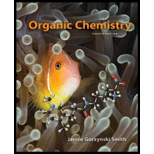
Draw all constitutional isomers having molecular formula C4H100. Classify each compound as a 1°, 2°, or 3° alcohol, or a symmetrical or unsymmetrical ether.
Interpretation:
To draw all the constitutional isomers for the molecular formula C4H10O and classify each compound as a 1°, 2°, or 3° alcohol, or a symmetrical or unsymmetrical ether.
Concept introduction:
Constitutional isomers also known as structural isomers. They are molecules that have the same chemical formula but their atoms are arranged differently. They are three main types of constitutional isomers.
a) Chain isomers – the carbon chain has a different order of carbon and hydrogen atoms.
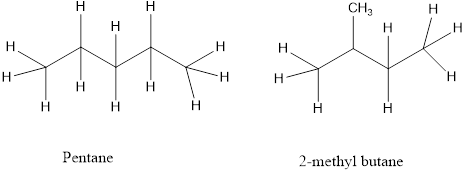
b) Position isomers- a functional group of the isomers is in a different location on the molecules.
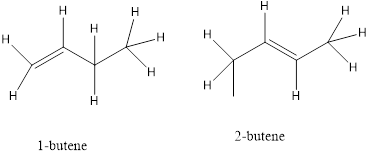
c) Functional isomers- the isomers contain a different functional group.
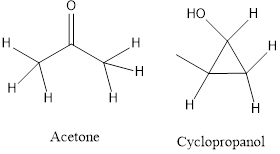
Answer to Problem 9.1P
Molecular formula C4H10O may be an alcohol and ether and seven isomers are shown below.
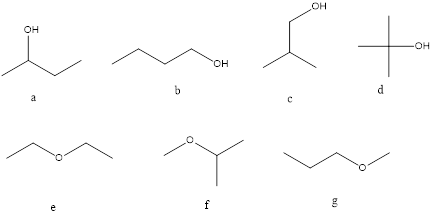
Strucutre,
A= 2o alcohol
B=1o alcohol
C=1o alcohol
D=3o alcohol
E=Symmetrical ether
F=Unsymmetrical ether
G=Unsymmetrical ether
Explanation of Solution
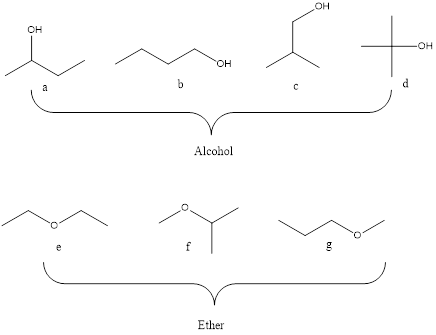
Alcohol are classified into 1o, 2o and 3o alcohol based on the number of the carbon atom bonded to carbon with OH functional group. Whereas the ether are symmetrical and unsymmetreical ethers. The ether that have two identical R groups is said to be symmetrical ether and having different R group is said to unsymmetrical ether.
Strucutre,
A= 2o alcohol
B=1o alcohol
C=1o alcohol
D=3o alcohol
E=Symmetrical ether
F=Unsymmetrical ether
G=Unsymmetrical ether
Thus seven constitutional isomers with functional groups alcohol and ether are obtained for the molecular formula C4H10O. And the structure,
A= 2o alcohol
B=1o alcohol
C=1o alcohol
D=3o alcohol
E=Symmetrical ether
F=Unsymmetrical ether
G=Unsymmetrical ether
Want to see more full solutions like this?
Chapter 9 Solutions
Organic Chemistry
- What is the final product when D-galactose reacts with hydroxylamine?arrow_forwardIndicate the formula of the product obtained by reacting methyl 5-chloro-5-oxopentanoate with 1 mole of 4-penten-1-ylmagnesium bromide.arrow_forwardIn the two chair conformations of glucose, the most stable is the one with all the OH groups in the equatorial position. Is this correct?arrow_forward
- please help me with my homeworkarrow_forwardhelparrow_forwardThe temperature on a sample of pure X held at 1.25 atm and -54. °C is increased until the sample boils. The temperature is then held constant and the pressure is decreased by 0.42 atm. On the phase diagram below draw a path that shows this set of changes. pressure (atm) 2 0 0 200 400 temperature (K) Xarrow_forward
- QUESTION: Answer Question 5: 'Calculating standard error of regression' STEP 1 by filling in all the empty green boxes *The values are all provided in the photo attached*arrow_forwardpressure (atm) 3 The pressure on a sample of pure X held at 47. °C and 0.88 atm is increased until the sample condenses. The pressure is then held constant and the temperature is decreased by 82. °C. On the phase diagram below draw a path that shows this set of changes. 0 0 200 temperature (K) 400 аarrow_forwarder your payment details | bar xb Home | bartleby x + aleksogi/x/isl.exe/1o u-lgNskr7j8P3jH-1Qs_pBanHhviTCeeBZbufuBYT0Hz7m7D3ZcW81NC1d8Kzb4srFik1OUFhKMUXzhGpw7k1 O States of Matter Sketching a described thermodynamic change on a phase diagram 0/5 The pressure on a sample of pure X held at 47. °C and 0.88 atm is increased until the sample condenses. The pressure is then held constant and the temperature is decreased by 82. °C. On the phase diagram below draw a path that shows this set of changes. pressure (atm) 1 3- 0- 0 200 Explanation Check temperature (K) 400 X Q Search L G 2025 McGraw Hill LLC. All Rights Reserved Terms of Use Privacy Cearrow_forward
 Chemistry & Chemical ReactivityChemistryISBN:9781133949640Author:John C. Kotz, Paul M. Treichel, John Townsend, David TreichelPublisher:Cengage Learning
Chemistry & Chemical ReactivityChemistryISBN:9781133949640Author:John C. Kotz, Paul M. Treichel, John Townsend, David TreichelPublisher:Cengage Learning Organic ChemistryChemistryISBN:9781305580350Author:William H. Brown, Brent L. Iverson, Eric Anslyn, Christopher S. FootePublisher:Cengage Learning
Organic ChemistryChemistryISBN:9781305580350Author:William H. Brown, Brent L. Iverson, Eric Anslyn, Christopher S. FootePublisher:Cengage Learning Organic And Biological ChemistryChemistryISBN:9781305081079Author:STOKER, H. Stephen (howard Stephen)Publisher:Cengage Learning,
Organic And Biological ChemistryChemistryISBN:9781305081079Author:STOKER, H. Stephen (howard Stephen)Publisher:Cengage Learning, General, Organic, and Biological ChemistryChemistryISBN:9781285853918Author:H. Stephen StokerPublisher:Cengage Learning
General, Organic, and Biological ChemistryChemistryISBN:9781285853918Author:H. Stephen StokerPublisher:Cengage Learning



